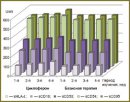
Тhe Importance of Soluble Forms of Differentiation Antigens in Prognosis of Infectious Mononucleosis, Caused by Epstein–Barr Virus, as Well as Antiviral and Immune Correction Therapy
The aim of the investigation is to assess the content of soluble forms of differentiation antigens in patients with infectious mononucleosis caused by Epstein–Barr virus (EBV) in relation to sex, age and severity of the disease, accompanying diseases, laboratory findings, the presence of DNA virus, and estimate their significance in the prognosis of the course of the disease and the efficacy of antiviral and immunocorrective therapy.
Materials and methods. Immune response was studied in 68 patients with mononucleosis caused by EBV (35 males, 33 females) aged 18–30 years. The content of soluble forms of differentiation antigens (CD95, sCD18, sCD50, sHLA-I, sCD54) was studied by immunodeficiency analysis using monoclonal and polyclonal antibodies to mononuclear cell antigens of human peripheral blood.
Conclusion. The criterion of adequate immune system response in patients with EBV infectious mononucleosis is high concentration of soluble forms of differentiation antigens (sCD95, sCD18, sCD50, sHLA-I, sCD54). In patients with negative results of DNA indication of EBV in blood there is high concentration of sCD18, sCD50, sHLA-I compared to positive results. It is likely to show the formation of stronger T-cell response, antigens formation and the decrease of replication viral activity.
- Ershov F.I. Antivirusnye preparaty [Antivirals]. Moscow: Meditsina; 1998; 192 p.
- Novikov V.V., Karaulov A.V., Baryshnikov A.Yu. Rastvorimye formy membrannykh antigenov kletok immunnoy sistemy [Soluble forms of membrane antigens of immune system cells]. Moscow: Med inform agentstvo; 2008; 249 p.
- Isakov V.A., Arkhipova E.I., Isakov D.V. Gerpeticheskie infektsii cheloveka [Herpes infections of human]. Saint Petersburg: “SpetsLit”; 2006; 301 р.
- Ross J.D., Smith J.W., Elton R.A. The epidemiology of herpes simplex types 1 and 2 infections of the genital tract in Edinburg 1978–1991. Department of Genitourinary Medicine Edinburg Royal Infirmary, UK. Genitourin Med 2003; 65(9): 381–383.
- Management of herpesvirus infectons in the immunocompromised host with and without HIV infection. Building international congress. IHMF 2006; p. 67.
- Babaev A.A., Novikov V.V., Ezhova G.P., Dobrotina N.A. Belki. Ch. 2: Membrannye belki adgezii [Membrane proteins of adhesion]. Nizhny Novgorod: NNGU; 2004; 60 p.
- Novikov V.V. Vestnik nizhegorodskogo universiteta im N.I. Lobachevskogo 2001; 1: 208–217.
- Ershov F.I. Sistema interferona v norme i patologii [System of interferon in norm and pathology]. Moscow: Meditsina; 1996; 239 p.










